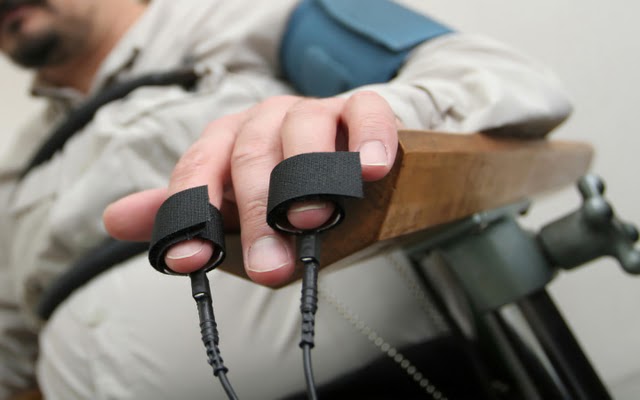
We have all been in a similar situation before. A family member enters the kitchen to find that someone has eaten their favorite snack. This leads to questions such as “Who did this?” and “Was it you?”
If you are the guilty party, you have two choices. You can either tell the truth and face the consequences, or you can attempt to tell a convincing lie. However, we strongly advise telling the truth as lying is not a good habit to develop. Furthermore, your family members can probably tell when you are being dishonest!
Nevertheless, not everyone can rely on these instincts. For instance, police officers often need to determine if a person is telling the truth. In such cases, they may turn to a specialized tool called a polygraph machine.
A polygraph machine, also known as a “lie detector,” is a device you may have seen in movies or TV shows. Have you ever wondered if these machines can truly detect when someone is lying?
Polygraph machines work by measuring certain physiological functions, including skin conductivity, heart rate, blood pressure, and breathing. These bodily functions are not easily controlled by the mind, and many people believe that monitoring them can reveal when a person is being dishonest. For example, a person’s blood pressure or heart rate might increase when they are lying.
So, what happens during a lie detector test? First, the person is connected to the polygraph machine. Then, an examiner asks them a series of questions, beginning with control questions that have known answers, such as the person’s name and address.
As the person answers the control questions, the examiner measures their physiological responses. This establishes a baseline reading. Next, the examiner asks the key questions to which they do not already know the answers. They record the person’s responses and continue monitoring their bodily functions.
At times, the examiner may observe that a person starts breathing rapidly or their heart rate increases when answering key questions. If this happens, the examiner may conclude that the person is being dishonest.
But how reliable are lie detector tests? Critics argue that polygraph machines are not dependable due to the presence of numerous variables. Many courts share this view, as lie detector results are often not admissible as evidence in trials.
Researchers have discovered that polygraph machines can detect lies in certain cases. However, they note that these machines often make errors. For example, people have employed various strategies to deceive the lie detector.
Is it possible to outsmart a lie detector? Maybe! One common strategy is to deliberately increase physical responses during the control questions, such as breathing faster or pinching oneself. This can establish a false baseline for the control questions.
Some individuals claim they can fool a lie detector by ensuring they get a good night’s sleep before the test. Others simply remain calm throughout the examination. Some people mentally repeat the control questions to themselves while answering the “real” questions. This technique may help them control their body’s reactions.
On the other hand, there are instances where examiners may erroneously conclude that someone is lying when they are actually telling the truth. It is common for individuals to feel nervous during a lie detector test, and the polygraph machine may interpret the body’s anxiety responses as signs of deception.
What are your thoughts on the reliability of polygraph machines? Is there a more effective method for determining honesty? Perhaps you can invent a superior lie detector! However, it’s important to remember that honesty is generally the best choice.
Give It a Try
Do you want to know the most accurate and foolproof way to beat a lie detector? Simply tell the truth! Yes, it’s as simple as that. Just be honest.
- From a young age, most children learn that lying is an undesirable habit. Lying erodes trust and hinders the development of meaningful friendships. Instead of lying, it’s important to cultivate a habit of telling the truth. You can start right now! Grab a pencil and paper, and create a list. Think of someone who holds great significance in your life. It could be a teacher, a friend, or a family member. Then, write down ten true statements about that person. These statements should describe or illustrate why the person is important to you. Once you’re done, share your list with the chosen individual!
- Do you trust the results obtained from polygraph machines? Imagine a situation where a friend or family member is contemplating the reliability of these machines. Write a persuasive letter or email to convince them to agree with your viewpoint.
- One of the physiological functions measured by a polygraph machine is blood pressure. What is blood pressure, and why does it hold significance? Explain what you have learned to a friend or family member.
Sources of Wonder
- http://en.wikipedia.org/wiki/Lie_detection (accessed 04 June 2020)
- http://en.wikipedia.org/wiki/Polygraph (accessed 04 June 2020)
- http://www.howstuffworks.com/lie-detector.htm (accessed 04 June 2020)





Leave a Reply